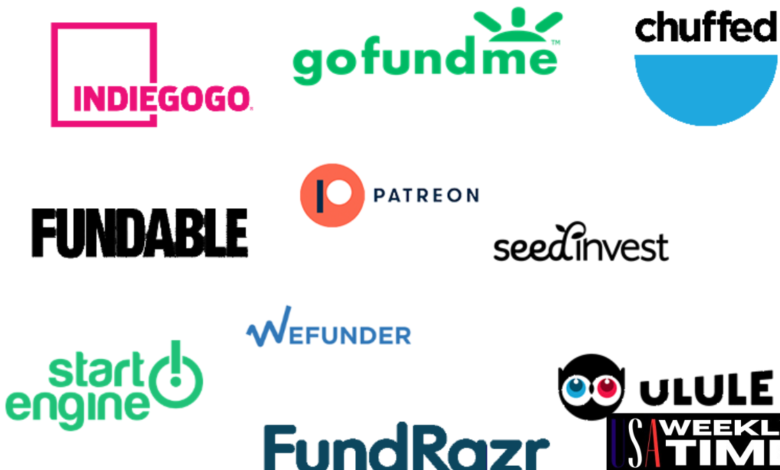GoFundMe Competitors: Exploring Alternatives in Crowdfunding

gofundme competitors Crowdfunding has revolutionized the way individuals and organizations raise money for various causes, projects, and personal needs. While gofundme competitors is often the first name that comes to mind when discussing crowdfunding platforms, it’s not the only option available. In this article, we’ll explore GoFundMe competitors, their unique features, advantages, and potential drawbacks, helping you find the right platform for your fundraising needs.
Understanding Crowdfunding
The Rise of Crowdfunding

Crowdfunding has gained immense popularity over the past decade, enabling anyone with an idea or cause to solicit funds from the public. Whether it’s for a personal emergency, a creative project, or a community initiative, platforms like gofundme competitors have made it easier than ever to connect with potential donors. The concept revolves around leveraging social networks to gather small contributions from a large number of people, which can significantly increase the chances of reaching financial goals.
Crowdfunding appeals to a wide audience, including individuals seeking assistance for medical expenses, entrepreneurs launching startups, artists funding creative projects, and nonprofits raising funds for community programs. The ability to share campaigns through social media amplifies outreach, allowing fundraisers to tap into their existing networks and beyond gofundme competitors.
The Benefits of Crowdfunding
The advantages of crowdfunding extend beyond simply raising funds. For many, it provides a platform for storytelling and sharing personal narratives, creating a deeper connection between fundraisers and donors. Donors often feel more inclined to contribute when they understand the story behind the request gofundme competitors.
Moreover, crowdfunding can serve as a marketing tool. A successful campaign can generate buzz around a product or cause, attracting attention from media outlets and potential investors. For entrepreneurs, it’s an opportunity to validate their ideas and gauge public interest before fully launching a product.
Key Considerations for Choosing a Platform
When selecting a crowdfunding platform, several factors come into play. These include fees, target audience, ease of use, available features, and the types of projects supported. Each platform has its unique offerings, which can influence a fundraiser’s success. Understanding these differences is crucial for choosing the right platform for your needs gofundme competitors.
GoFundMe: A Brief Overview
The gofundme competitors Platform
gofundme competitors is one of the largest and most recognizable crowdfunding platforms, primarily focused on personal and charitable fundraising. Founded in 2010, it has raised billions of dollars for various causes, from medical bills to disaster relief. GoFundMe allows individuals to create campaigns quickly and share them widely, leveraging social media for maximum exposure.
One of the standout features of gofundme competitors is its user-friendly interface, which simplifies the process of setting up a campaign. Users can easily customize their pages with photos, videos, and detailed descriptions, creating compelling narratives that resonate with potential donors.
Fee Structure and Payouts
gofundme competitors operates on a straightforward fee structure. Unlike many other platforms that charge a percentage of the funds raised, gofundme competitors allows users to keep all donations without charging platform fees for personal campaigns. However, they do deduct standard payment processing fees, which typically range from 2.9% plus $0.30 per donation. This transparency has made it an appealing option for many fundraisers.
Success Stories and Impact
Over the years, gofundme competitors has seen numerous success stories, with campaigns raising significant funds for individuals and organizations in need. High-profile campaigns, such as those for medical treatments or social justice initiatives, have garnered widespread attention, showcasing the platform’s potential to mobilize communities and effect change.
Top GoFundMe Competitors
While gofundme competitors remains a popular choice, various competitors offer distinct advantages that may better suit different fundraising needs. Let’s delve into some of the most notable alternatives.
Kickstarter
Overview of Kickstarter
Kickstarter is primarily known for supporting creative projects, from art and music to technology and film. Launched in 2009, it has helped launch thousands of successful projects and has raised billions in funding. Unlike GoFundMe, Kickstarter operates on an all-or-nothing model, meaning that projects must reach their funding goal within a set time frame to receive any of the pledged funds.
Advantages of Kickstarter
One of Kickstarter’s major benefits is its focus on creative endeavors. Backers are often motivated by the desire to support innovative ideas, and successful campaigns frequently offer rewards or incentives for contributions, such as early access to products or exclusive merchandise. This can create a sense of community among backers, fostering loyalty and ongoing support.
Kickstarter also has a strong emphasis on project validation. Because funds are only released if the funding goal is met, it encourages creators to market their projects effectively and connect with potential backers before launching.
Potential Drawbacks
However, the all-or-nothing approach may deter some fundraisers, particularly those seeking support for personal causes or emergencies. If a project does not meet its funding goal, all pledged contributions are returned to the backers, which can lead to disappointment and lost opportunities for creators. Additionally, Kickstarter’s focus on creative projects may not be suitable for those looking to raise funds for medical expenses or community initiatives.
Indiegogo
Overview of Indiegogo
Indiegogo is another prominent crowdfunding platform that supports a wide range of projects, including creative endeavors, personal causes, and community initiatives. Founded in 2008, it operates on a flexible funding model, allowing campaign creators to keep funds raised even if they don’t meet their goals.
Advantages of Indiegogo
One of the significant benefits of Indiegogo is its flexibility. Campaign creators can choose between fixed funding (similar to Kickstarter’s model) and flexible funding, which allows them to keep whatever funds they raise. This is particularly appealing for those who may have varying needs or who want to ensure they can still access funds, even if they don’t reach their initial target.
Indiegogo also offers a range of tools and resources for campaigners, including marketing support and analytics, which can help creators refine their strategies and reach more potential backers.
Potential Drawbacks
Despite its advantages, Indiegogo may not have the same level of brand recognition as gofundme competitors or Kickstarter. This could affect the visibility of campaigns, especially for those who rely heavily on organic reach. Additionally, the platform’s fee structure is somewhat complex, with a standard 5% fee on funds raised, plus payment processing fees.
Fundly
Overview of Fundly
Fundly is a crowdfunding platform that focuses primarily on personal causes and charitable fundraising. Established in 2010, it allows users to create campaigns for a wide range of needs, including medical bills, education, and nonprofit projects.
Advantages of Fundly
One of the main advantages of Fundly is its user-friendly interface, which simplifies the process of setting up and managing campaigns. Users can easily share their campaigns through social media, email, and text messages, maximizing outreach potential.
Fundly also has a mobile app that allows users to manage their campaigns on the go, making it convenient for fundraisers to stay engaged with their donors and track their progress in real-time.
Potential Drawbacks
While Fundly offers several benefits, it does charge a platform fee of 4.9% on funds raised, in addition to standard payment processing fees. This can eat into the total amount raised, making it less appealing for some fundraisers. Additionally, Fundly may not have the same level of brand recognition as GoFundMe, which can impact campaign visibility.
JustGiving
Overview of JustGiving
JustGiving is a UK-based crowdfunding platform that focuses on charitable fundraising. Established in 2001, it has raised millions for various causes, including personal emergencies, medical expenses, and nonprofit initiatives. JustGiving has gained a reputation for its strong community focus and commitment to social good.
Advantages of JustGiving
JustGiving’s emphasis on charity and nonprofit fundraising sets it apart from many competitors. It allows individuals to support causes they care about while also enabling organizations to fundraise for specific projects. The platform also provides a variety of tools for campaigners, including analytics and social sharing options, to help maximize outreach and engagement.
Moreover, JustGiving has built a strong network of partnerships with charities, enhancing its credibility and reach. This can be particularly beneficial for those fundraising on behalf of established organizations or causes.
Potential Drawbacks
On the downside, JustGiving charges a fee of 5% on funds raised, plus payment processing fees. This fee structure may deter some users, especially those who are already facing financial challenges. Additionally, JustGiving primarily caters to the UK market, which may limit its effectiveness for fundraisers in other regions.
GiveSendGo
Overview of GiveSendGo
GiveSendGo is a faith-based crowdfunding platform that allows individuals to raise funds for personal, charitable, and religious causes. Founded in 2014, it has quickly gained popularity among those looking for a platform that aligns with their values.
Advantages of GiveSendGo
One of the standout features of GiveSendGo is its commitment to supporting Christian causes. The platform is designed to create a supportive community for those raising funds for religious initiatives, missionary work, and personal emergencies. The emphasis on faith and community can foster a strong connection between fundraisers and their supporters.
GiveSendGo also does not charge a platform fee, allowing users to keep all donations minus standard payment processing fees. This can be particularly appealing for those looking to maximize their fundraising efforts.
Potential Drawbacks
However, the niche focus of GiveSendGo may limit its appeal to those who do not identify with the platform’s religious values. Additionally, the site may not offer the same level of visibility or outreach as more established platforms like gofundme competitors or Kickstarter.


